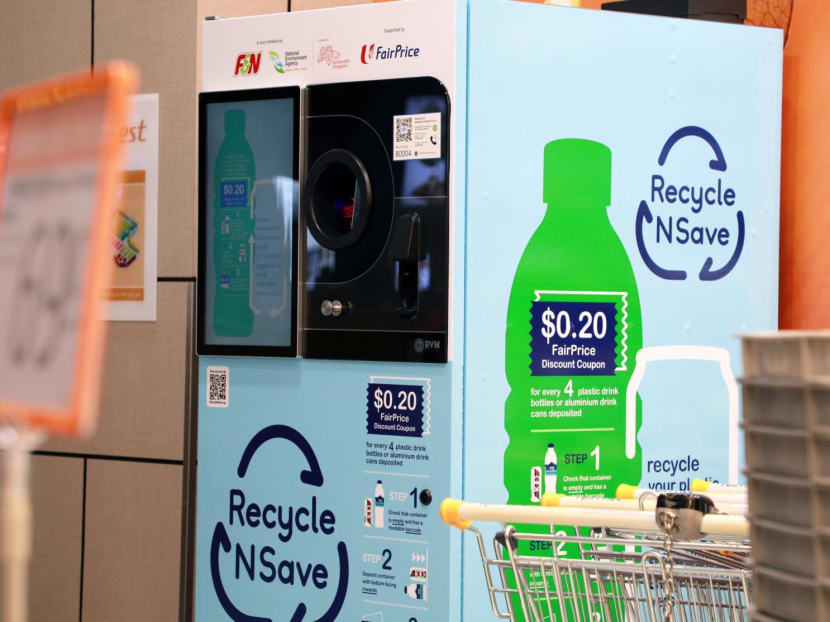- Joined
- Oct 3, 2016
- Messages
- 35,356
- Points
- 113
NEA's proposed recycling scheme for drink bottles and cans ‘good in theory’ but execution will be tricky, consumers say

A reverse vending machine at a supermarket that accepts empty aluminium drink cans and plastic drink bottles for recycling, in return for a 20-cent supermarket discount voucher.
- Consumers interviewed by TODAY generally welcomed proposals to introduce a deposit return scheme for beverage containers
- However, some said that for it to work, collection points need to be sufficient and in easily accessible spots
- Some coffee-shop owners said that the scheme may hinder business operations
On Tuesday (Sept 20), the National Environment Agency announced that it is looking to have a scheme that would require consumers to pay 10 to 20 cents more for pre-packaged drinks in plastic or metal containers from mid-2024.
To get their deposit back, consumers will have to return their empty, unwashed containers to a designated return point. They can do so either over the counter with a shop cashier, or at a reverse vending machine.
A reverse vending machine is essentially a contraption that will dispense a cash amount after a user inserts the appropriate beverage containers — identified with a special barcode.
One concern raised by 37-year-old engineer Claire Gwee was that a lack of infrastructure, or return points, could end up frustrating consumers.
“And it will be quite unfair if we end up spending more but have a hard time getting the deposits back because there are not enough of these return points,” she said.
Under the proposal, all large supermarkets with a floor area of more than 200sqm, which now number about 400, would have return points.
NEA is also proposing that return points be set up in other locations such as mini-marts, food courts and shopping centres.
The agency also proposed for the operator of the scheme to be “industry-led” as this will minimise costs and also promote accountability and efficiency. The scheme itself will also not be for profit.
Consumers such as Madam K Rajeswary, a 59-year-old homemaker, suggested that it will better if every public housing block has a reverse vending machine.
That way, she said, residents will not “just dump the cans and bottles in the blue (recycling) bin” that she noticed are usually overflowing.
Mr Jackson Ong, 40, who is self-employed, painted a scenario that may happen should reverse vending machines not be located under a resident’s housing block: People may end up being stuck with empty drink cans and “hoarding a stash of containers” until they have accumulated enough to make it worth their while to lug them to the nearest return point.
“But it also means I need to spend time cleaning these containers so they don’t attract pests in my home,” he added, even though there is no need to wash them under the proposed scheme.
Mr Ong is not overly concerned about paying an extra 10 or 20 cents for a canned drink, but he said that it could add up when bought in bulk.
Taking the example of a particular brand of istonic drink sold at a supermarket, he said that it is selling at around S$14 for a carton of 24 cans.
Since it might take time to finish the drinks, it also means that it would be a while before the consumer sees the return of his S$4.80 deposit, assuming it is a 20-cent deposit for each can.
It may not look like a lot of money, but he said that "every little bit does add up".
“The scheme seems good in theory, but we really need to know that we won’t be at the losing end (cost-wise) because of it,” he added.
POSSIBLE INCONVENIENCE FOR EATERIES
As for coffee-shop owners, at least one is taking a wait-and-see approach and said that it was too early to predict what kind of impact it will have on his business.Mr Johnny Ang, who owns a coffee shop in Geylang, also said that it is not as though business owners such as himself have much of a say.
“If (the Government) wants to do this, then we also have no choice.”
However, Mr Andrew Karthikeyan, a business development manager for the ABC Restaurant Group, which runs 17 eateries, foresees that the scheme could inconvenience the group’s operations.
He said that for one thing, having a reverse vending machine at any of his outlets would take up the space of a table or two.
“I don’t get back anything for it… it’s just wasting space.”
Businesses such as Mr Karthikeyan's will similarly have to pay a higher cost for drinks due to the deposit charge. It was not stated in NEA's proposal if businesses will be incentivised to have a reverse vending machine.
As for the alternative, which is returning the containers to the cashier, Mr Karthikeyan said that it could lead to a situation of creating another queue for customers.
And since not every customer would be willing to queue to get their deposit back, particularly during lunch hour, customers could end up forgoing it, he added.
When asked if it would be possible for his business to absorb the cost of the deposits by pouring the drinks out for customers and retaining the containers, Mr Karthikeyan said that it is not only extra labour for his crew, it is also not something every customer wants.
“Even though it's such a minor thing (to pour a fizzy drink), if we have about 30 customers coming to my restaurant at a single time, my staff is going to pour the drink, wait for the carbonation to set before serving… all this takes time.”
Moreover, some customers prefer to sip on their drink at the end of the meal, and it may be flat by the time they get to it if the drink is pre-poured.
